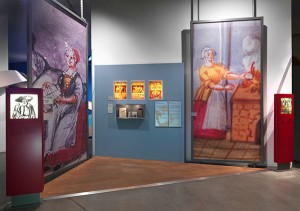Why Lilith Fascinates Our Visitors
One of the tours of the permanent exhibition that I offer regularly is on the subject of women in Judaism. Visitors interested in this topic are usually women’s groups and people already familiar with the essentials of Judaism and Jewish history. I enjoy the lively discussions I have with participants of this tour. When we talk about the life of Glikl of Hameln, Dorothea Schlegel, Albertine Mendelssohn-Bartholdy, and Else Lasker-Schüler, or about Lilith and Eve, we’re also discussing women’s rights – and that means our own rights!
People have heard a wide variety of things about Lilith: “Doesn’t she appear in Goethe’s Faust?” “Lilith is important for fortune telling with cards.” “Adam’s first wife, before Eve.” Some think of Lilith as a threatening ghostly figure, and others named their daughter after her, since she also represents self-determination, independence, unbridled ferocity, and joyous sensuality. Her model of life contrasts with the traditional image of women – in fact, she is Eve’s foil. No wonder that the name Lilith is known above all in feminist circles. → continue reading
